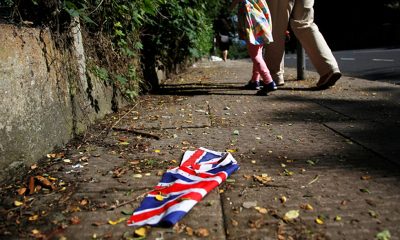Reuters photo
By
Ananya S Guha
I remember in school in one of our units on World History we also had to study International Relations during the times of Bismarck or Hitler. And that for a class eleven students wasn’t that easy. But that was a part of World or European History today. Perhaps what is International Relations today, will turn into History tomorrow.
History is archived in the past culled out of present day happenings, described as historic and impacting the world. The present European Union debate will I am sure become part of a unique historic event, the resistance of the United Kingdom to remain in the confederation, the proposed resignation of her Prime Minister, the endless debates of whether it was right or wrong, the apparent causes- social, economic and political. But how will history view it? Will it be a cold assimilation of facts, or will it be the thunder of today, with Scotland and Ireland resisting, with talks about Scotland’s breakaway, or the possibility of Northern Ireland and the Republic of Ireland uniting? Many are calling it an extreme form of democracy which should not shove out political interests of a Nation, many lauding the United Kingdom for a referendum, in a free, fair play manner. Many others are insinuating that the people in general are fed up of a country or rather a confederation of four states in the face of poverty, spiralling up, fear of immigration, insecurity in the midst of threats from world terrorists. And that also, the present Prime Minister, a friend of other powerful Nations, has been a party to unleashing invasions in other parts of the world, almost as a prelude to the third world war. Different interpretations continue unabated. The cynics and the prophets of doom see it as cataclysmic for the economic prosperity of a Nation.
I am still trying to grapple with what actually happened and sitting here in India, it is perhaps difficult to understand the mindset of a people who have had a long history of imperialism, a cultural synchronicity with the rest of Europe, a resilience to absorb other people of the world, and a race known for it’s dispassion as well as cynicism.
History is just about being unfurled. But the present happenings indicate clearly that the referendum was allowed by the leaders. And if it had to be allowed the decision has to be respected. And it is. What the other parts of the world feel maybe a silent acceptance and a deference to the wishes of the people of that country. The European Union itself has said stoically the the UK must go after completing formalities, leaving is as formal as entering. The Prime Minister has decided to step down as he was not in favour of leaving. The entire happening has been named by our smug and irrepressible media as ”Brexit”. Now we may also have have a Scottish Exit or an Irish Exit. Will the History of the future mull over these possibilities even if they do not actually take place? Is History also speculative, or will it only neatly record facts. The International Relations of today is the History of tomorrow, no matter what and how disciplines are we give nomenclatures!
It is perhaps the complexity of International Relations which makes History befuddling. Tomorrow Historians with their acuity may damn the present Prime Minister, or carp on the declining economic conditions of a country, or might even say that the power and glory it once had, and tried to perpetuate it with it’s bedfellows is now to say the least, on the wane. The people, the poor and the middle classes have pronounced ”Enough is Enough!” International Relations will perhaps aver that the people of the United Kingdom are queasy about being part of an Union, among countries who once upon a time looked at it with subservience.
Whatever the interpolations or the extrapolations, whatever analysts or the super analysts say, whichever country may leave or remain in the UK, History will always maintain that this happened in an unequivocal referendum in the month of June 2016 in the United Kingdom which a country and it’s politico regime allowed and finally accepted. Can this happen anywhere else?
I personally think that underlying all this deep scepticism there are lessons to be drawn- of pragmatism, self will, objectivity and of course the much cliched word, Democracy. We in India mouth that word but more often than not fail to see it in a context which speaks of deprivation, poverty and the less fortunate. If we are to strip this word out of a political import or meaning it would mean rights, equitable distribution of everything, from wealth to political power. It would mean the right to education and for all, it would mean in short a good life. The people of the United Kingdom have done just that, voted for a free life, for a betterment of decent living, for secure living emancipated by the crushes of international terrorism and neo liberalism.



No Comments Yet!
You can be first to comment this post!